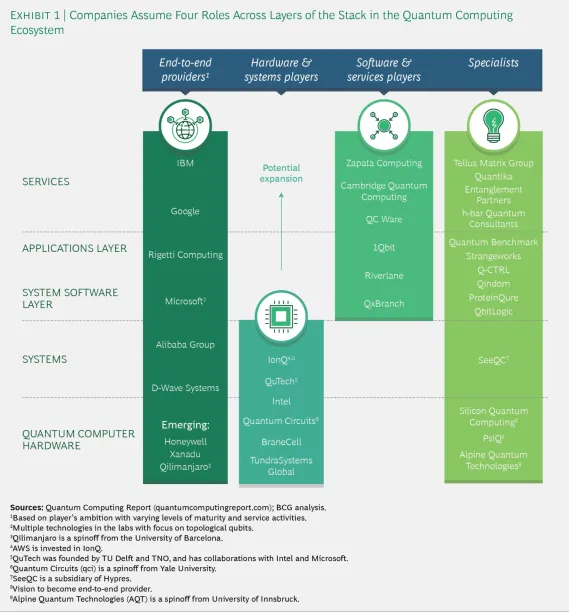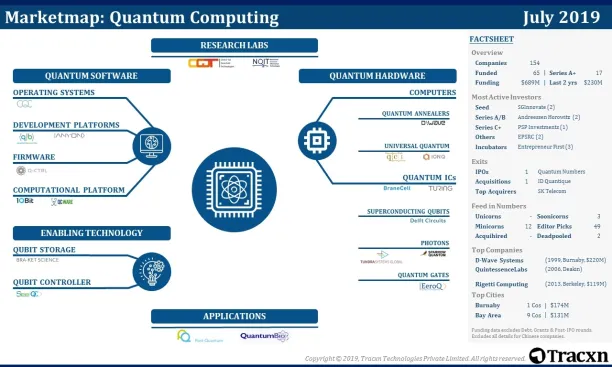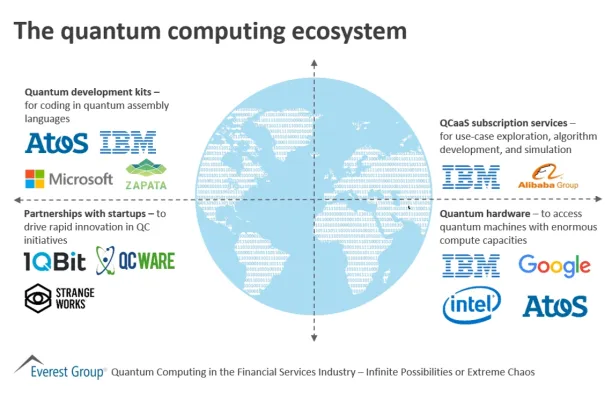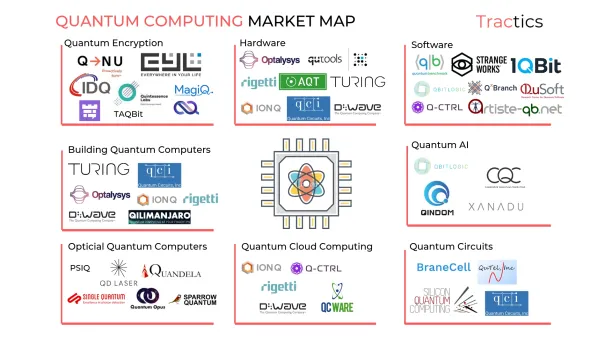Quantum computing, which has wide-ranging applications in optimization, research and cryptography, is driven by these organizations:
- End-to-end solution providers
- Quantum hardware builders
- Software & services companies
- Research labs
- Companies that use quantum computers in their business (Not the focus of this article)
Quantum hardware is an emerging computing technology which relies on complex hardware. As in the early days of personal computing, there are companies specialized on hardware, software and end-to-end solutions.
In the early days of computing, Apple built end-to-end solutions, while Microsoft specialized in software and many OEMs and IBM (Original Equipment Manufacturers) specialized in hardware and services.
In addition to these, research labs (like the Bell Labs during the personal computing revolution) play an important role in driving research. In some market maps, technology enablers or subscription services are considered separate parts of the ecosystem, however we preferred to consider these as hardware or software providers.
This division of companies is based on our research of 4 quantum computing ecosystem maps by leading companies in the space. If you want to know what quantum computing is before we dive in, feel free to read our comprehensive article on quantum computing.
Different perspectives on quantum computing ecosystem
In all 4 ecosystem maps on quantum computing, software and hardware vendors were identified. However, there are also significant differences between these ecosystem maps. BCG focuses on end-to-end providers, Tracxn includes research labs, Everest points out startups and Tractics focuses on use cases of quantum computing.
Because quantum computing is still a developing technology, it is difficult to draw definite limits in the ecosystem. When looking at quantum computing from different sides, different ecosystem maps can be prepared. Especially large companies can take place in different areas of the ecosystem at the same time.
BCG
BCG examined the quantum computing ecosystem across four main lines: end-to-end providers, hardware & system players, software & services players and specialists.
 Source: BCG
Source: BCG
Tracxn
Tracxn’s quantum computing ecosystem focuses on both quantum hardware and quantum software. This market map also focuses on research labs, technology enablers (quantum circuits, quantum sensors) which provide hardware inputs to quantum computers and companies focused on applications of quantum computing.

Source: Tracxn
Everest
Everest’s perspective on quantum computing ecosystem focuses on four different categories:
- Quantum development kits
- QCaaS subscription services
- Partnership with startups
- Quantum hardware
With this breakdown, there are companies that overlap on different sides of the ecosystem. Additionally, we see subscription services as a way to monetize hardware so we did not consider it to be a different category.

Tractics
Tractics’ market map includes companies which use quantum computing as a tool for their applications. However, quantum computing applications is a category with numerous companies. We think it should be analyzed separately rather than including in an ecosystem map that also covers quantum hardware and software companies.

What are the different types of quantum computing companies?
End to end solution providers
Tech giants; IBM, Google, Microsoft and, growing start-ups Rigetti, D-wave can be considered end-to-end providers. These companies enable other companies to test quantum solutions on cloud.
- D-wave is the first company that sold a quantum computer to American defense company, Lockheed Martin.1
- IBM provides access via the cloud to test the quantum algorithms developed with IBM-Q.
- Microsoft provides cloud quantum computing as Azure in collaboration with IONQ, Honeywell and QEI.
- Google, Alibaba, D-Wave, and Rigetti provide end to end services.
- Amazon launched Braket in partnership with D-Wave, IonQ and Rigetti.2
Hardware Systems Builders
Companies interested in quantum hardware often work on optimizing quantum computers and creating environments for simulations. Tech giants offering end-to-end solutions are included here as well. Hardware side of quantum computing can be separated into two:
- Universal gate based quantum computers (also called general purpose quantum computers)
- Quantum Annealing.

Quantum computer providers
D-wave, IBM, Alibaba, Intel, Rigetti, Google are the main players for this sector. These companies are racing to produce the first commercially relevant quantum computer.
Quantum circuitry providers
QCI, Delft Circuits, BraneCell, Turing, See QC are among the companies to develop and commercialize superconducting quantum technologies.
| Company Name | Area | Number of Employees |
|---|---|---|
| D-wave | Quantum Computer Provider | 180+ |
| IBM | Quantum Computer Provider | 350,000 |
| Alibaba | Quantum Computer Provider | 102,000 |
| Intel | Quantum Computer Provider | 107,400 |
| Rigetti | Quantum Computer Provider | 146 |
| Quantum Computer Provider | 85,050 | |
| Quantum Circuits, Inc. | Quantum Circuitry and Providers | 11-50 |
| Delft Circuits | Quantum Circuitry and Providers | 11-50 |
| BraneCell Systems | Quantum Circuitry and Providers | 51-200 |
Turing Inc. | Quantum Circuitry and Providers | N/A |
| See QC | Quantum Circuitry and Providers | 1 to 10 |
Software & Services Companies
Another part that works to bring real-world solutions with quantum computing is quantum software providers. The main task of these companies is to produce solutions using quantum computing, according to the needs of the users.
Operating systems and firmware
Cambridge Quantum Computing and Q-ctrl works on improving the optimization of quantum hardware and provide solutions to access the quantum world with software
Development Platforms
Companies in this category focus on creating programming algorithms and tools. Zapata, Anyon, Qb are among these companies.
Computational Platforms
1Qbit, QCware are the companies that aim to solve difficult problems of industry by using quantum computing software techniques.
| Company Name | Area | Number of Employees |
|---|---|---|
| Cambridge Quantum Computing | Operating systems and firmware | 10 to 50 |
| Q-ctrl | Operating systems and firmware | 30 |
| Zapata | Development Platforms | 35 |
| Anyon | Development Platforms | 13 |
| Quantum Benchmark | Development Platforms | 10 |
| 1Qbit | Computational Platforms | 103 |
| QC Ware Corp. | Computational Platforms | 10 to 50 |
Research Labs
There are numerous research laboratories founded by university-industry cooperation. Additionally, there are government funded labs. Some of them are:
- Quantum Computing Laboratory – MIT Lincoln Laboratory
- Institute for Quantum Information and Matter – Caltech
- Chinese Academy of Sciences with Alibaba
- UK National Quantum Technologies Programme
- National Quantum Initiative Act – US House of Representatives
- Microsoft contributed research Labs at TU Delft, Niels Bohr Institute, University of Sydney, Purdue University, University of Maryland, ETH Zurich, UCSB
For more quantum computing
If you are interested in learning more about quantum computing, read:
- Quantum Computing Statistics: Forecasts & Facts
- Future of Quantum Computing: in-Depth Guide
- Quantum Hardware Components, Interfaces & Challenges
Finally, if you are interested in adopting a quantum computing ecosystem for your enterprise, we have a sortable, prioritized list of quantum computing companies.
If you have questions about how quantum computing can impact your business and how you can get started, we can help:
External Links
- 1. “D-Wave sells first commercial quantum computer to Lockheed Martin“, Engadget, May 29, 2011, Retrieved October 22, 2024.
- 2. “D-Wave has its first customer for a $15 million quantum computer“, Engadget, January 26, 2017, Retrieved October 22, 2024.


Comments
Your email address will not be published. All fields are required.